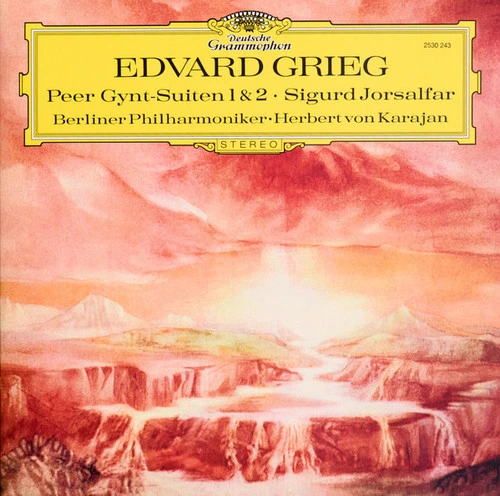100% Pure Analogue 180g Virgin Vinyl LP!
DG's The Original Source Series!
Remastered from the Original 4-Track Recordings at Emil Berliner Studios!
No Tape Copies Used, No Unnecessary Devices in the Signal Path, No Digital Sound Processing!
Pressed by Optimal!
Hand-Numbered, Limited Edition!
This item not eligible for any further discount offers!
The interpretation of Edvard Grieg's two Peer Gynt Suites, combined with orchestral pieces from his Sigurd Jorsalfar, occupies an important position among the highly acclaimed recordings by the Berliner Philharmoniker and their chief conductor, Herbert von Karajan. With their brilliant and expressive interpretation, the musicians demonstrate an enormous sensitivity for the Norwegian composer's unique atmospheric tonal language.
For its 125th birthday, Deutsche Grammophon started releasing legendary recordings with the highest sound standards: The audiophile vinyl series The Original Source presents outstanding recordings from the 1970s in a whole new sound quality. For this, the renowned Emil Berliner Studios have remastered and edited the original four-track tapes in 100% analog quality (AAA) using technologies developed specifically to produce the series. The sonic differences to the original releases are considerable: greater clarity, more subtleties and improvements in frequency response, while at the same time less background noise, distortion and compression allow for an audiophile listening experience like never before.
On 180g vinyl records and in a deluxe gatefold edition with original covers and lyrics, the copies of this series are released limited and numbered, accompanied by additional photos and facsimiles of the recording logs and band boxes, and an article explains the exact technical background.
The Original Source Series:
The Original Source is one of several new initiatives introduced by Deutsche Grammophon in 2023 as part of its 125th-anniversary celebrations. The Original Source draws on the technical innovation that has been part of the label's identity ever since it was founded in 1898 by Emil Berliner, inventor of the gramophone.
"Deutsche Grammophon's distinctive nature was forged by iconic classical artists of the past, whose recordings are of timeless quality," notes Dr. Clemens Trautmann, President of Deutsche Grammophon. "Everything we do today is embedded in the wonderful 125 years of history we're celebrating this year and, in this new series, exceptional creative content goes hand in hand with the finest engineering techniques. We're delighted to present great music to our listeners in a unique audio format that will invite them to engage in a conscious listening experience."
Rainer Maillard, recording producer and managing director of Emil Berliner Studios, explains more about the process involved in creating The Original Source series:
"Sometimes many years have to pass before old treasures are rediscovered. For its 125th anniversary in 2023, DG will be reissuing a series of legendary recordings from the 1970s, cut for the first time directly from the 4-track ½-inch masters, rather than the stereo ¼-inch tape copies. The result will be the highest possible, audiophile quality, giving listeners the chance to enjoy this repertoire as never before.
"In order to better understand the background to this extraordinary series, it is worth looking at DG's technical developments in sound recording. It started recording for quadraphonic surround sound as early as 1970. The format was 4-track analogue tape, with left, right, front and rear channels. After the recording was finished, the 4-track tapes were edited in the studio at DG's site in Hannover. The various takes were cut with scissors and joined together again with sticky tape.
"Back then, however, there was no consumer format ready for quadraphonic playback, so DG was producing for the future. The label did release these recordings on regular vinyl LPs in stereo, of course, which meant the engineers had to create a stereo downmix of the 4-track master tape. For international distribution, DG made copies of this copy and sent them around the world for local manufacturing.
"A tape copy can never sound as good as the original master tape, so the idea was born to make a product of the highest quality by using the original 4-track masters instead of the 2-track copies for lacquer cutting. They sound sensational, thanks to the expert team involved back in the day, and the analogue recording technology they were using.
"For the new releases, two technical aspects have to be taken into account. Firstly, 4-track tape is twice as wide as the usual 2-track tape; therefore, we need a special tape machine. This has to be able to deliver a so-called preview signal, which allows the disc-cutting lathe to etch a perfect groove on the disc. Our tape machine had to be modified for this purpose and is probably the only one of its kind in the world right now. Secondly, we need to mix the front and rear channels down to stereo in real time. A completely new, custom-built mixing desk was required for this project. Emil Berliner Studios have designed a passive mixer, which renders the highest quality without introducing any additional noise to the signal.
"The Original Source Series means: no tape copies used, no unnecessary devices in the signal path and, of course, no digital sound processing. This is the shortest possible way from the original master to the cutter head.
"Compared to the original releases, the advantages in sound for the vinyl reissues are outstanding: greater clarity, more details and a better frequency response; less noise, less distortion, less compression… Enjoy!"
Features
- Hand-Numbered, Limited Edition - 3,300 Copies
- The Original Source Series
- 100% Pure Analogue
- 180g Virgin Vinyl
- Mixed by Rainer Maillard
- Cut Directly from the 4-Track 1/2-inch Masters by Sidney C. Meyer at Emil Berliner Studios
- Pressed by Optimal
- Deluxe Gatefold
Musicians
| Berliner Philharmoniker | |
|---|---|
| Herbert von Karajan | conductor |
Selections
Edvard Grieg (1843-1907)
Side 1:
Peer Gynt-Suite Nr. 1 op. 46
- I. Morning. Allegretto pastorale
- II. Death of Aase. Andaante doloroso
- III. Anitra's Dance. Tempo di Mazurka
- IV. Hall of the mountain king. Alla marcia e molto marcato
Peer Gynt-Suite Nr. 2 op. 55
- I. Abduction and Ingrid's Lament. Allegro Furioso — Andante
- II. Arab Dance. Allegretto vivace
Side 2:
- III. Peer Gynt's homecoming. Allegro agitato — attacca
- IV. Solveig's Song. Andante — Allegretto tranquillamente
Sigurd Jorsalfar – Three Pieces for Orchestra, Op. 56
- I. Prelude (In the King's Hall). Allegretto semplice
- II. Intermezzo (Borghild's Dream). Poco Andante — Allegro agitato — Andante espressivo
- III. Homage March. Allegro — molto — Allegretto marciale — Maestoso




 Turntable Accessories
Turntable Accessories Headphone Accessories
Headphone Accessories Cable Accessories
Cable Accessories Vinyl Accessories
Vinyl Accessories Compact Disc Accessories
Compact Disc Accessories








